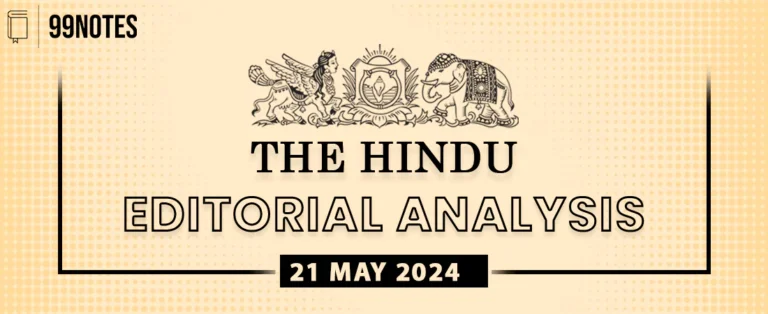14 August 2023 : The Hindu Editorial Notes PDF
The Hindu Editorial
14-August-2023
Daily Current Affairs For UPSC ,The Hindu Editorial Summary
1. Pakistan’s political roller coaster continues.
Topic: GS2 – International relations
Context:
- After Pakistan Parliament dissolved; Imran Khan still remains the most popular politician despite uncertainties.
- Former Prime Minister Imran Khan sentenced to 3-year jail term and barred from politics for 5 years, pending appeals.
- Uncertainty surrounds whether elections will be held within 90 days as mandated.
- Outgoing coalition government’s contradictory statements contribute to uncertainty.
Impact of unstable Pakistan for India:
- Security Concerns: Instability in Pakistan can lead to cross-border tensions, affecting India’s national security.
- Terrorism: Unstable conditions might foster a breeding ground for terrorist activities that could spill over into India.
- Border Management: Instability could challenge border management efforts, leading to increased infiltration attempts.
- Diplomatic Challenges: Turbulence in Pakistan may strain diplomatic relations and complicate negotiations.
- Trade Disruptions: Unstable situations might disrupt trade and economic ties between the two nations.
- Radicalization: Unstable conditions may encourage radicalization, impacting regional stability.
- Increased Military Preparedness: Unstable Pakistan could prompt India to enhance its military preparedness.
- Internal Security: Instability might impact India’s internal security due to potential spillover effects.
- Geopolitical Dynamics: An unstable Pakistan could alter regional geopolitical dynamics, affecting India’s strategic interests.
Way forward:
- Diplomacy and Dialogue: Engage in sustained diplomatic efforts to foster dialogue and resolve differences through peaceful means.
- Strengthen Border Security: Enhance border management and security measures to prevent infiltration and ensure stability.
- Counterterrorism Cooperation: Collaborate closely on counterterrorism efforts to address shared security concerns.
- Promote Regional Stability: Work with international partners to promote stability in the region, minimizing the spillover of instability.
- Engage in Confidence-Building Measures: Initiate confidence-building measures to ease tensions and enhance trust.
- Economic Cooperation: Continue economic engagement to improve the socio-economic conditions of both nations.
- Track II Diplomacy: Support unofficial diplomatic channels to foster dialogue and understanding between the two countries.
2. Rebooting the codes
Topic: GS2 – Indian polity.
Context:
- Laws need periodic updates to align with technological advancements and societal changes.
- Introducing entirely new Codes with complex names, while retaining old laws in substance, raises concerns.
Concerns raised over new bills:
- Criticisms of the Bharatiya Nyaya Sanhita (BNS), Bharatiya Nagarik Suraksha Sanhita (BNSS), and Bharatiya Sakshya Bill:
- Unnecessary to exclusively use Hindi names, as official translations exist.
- Indian laws have official translations in state languages, questioning the need for exclusive use of Hindi names for IPC, CrPC, and Evidence Act.
- Criminal procedure law re-enacted in 1973 as CrPC, 1973, distinct from 1898 version.
- Hindi names seem to symbolize de-anglicization, but much original language retained.
- New laws retain much original language, raising doubts about the necessity for complete re-enactment.
- Parliamentary Standing Committee scrutiny of ‘Sanhitas’ is a consolation due to inadequate consultation.
Substantive changes the in the code:
- Welcoming the deletion of ‘sedition’ and introduction of new Section 150.
- New Section 150 avoids overbroad terms of promoting ‘disaffection’ or ‘hatred/contempt’ against the government.
- New Section 150 criminalizes promoting secessionism, separatism, armed rebellion, subversive activities, and endangering national sovereignty.
- Notable additions of ‘mob lynching’ and ‘organized crime’ sections.
- Notable omission of ‘hate speech’ despite prolonged discussions about defining and punishing it.
- Procedure code allows trials of proclaimed offenders in absentia.
- Mandatory videography of seizures and provision for deemed sanction if authorities don’t grant it within 120 days are positive.
- Criticism of new remand provisions allowing extended police custody beyond current 15-day limit.
Conclusion:
- Overall, the new laws require thorough critical scrutiny, but retaining the old names is considered sufficient.
3. Govt. should have stayed true to top court judgment on ECI selection process.
Topic: GS2 – Indian polity.
Context:
- The Union government proposes a three-member selection panel with executive majority for Election Commission appointments.
- Bill in Rajya Sabha suggests panel comprising Prime Minister, Leader of Opposition, and Union Cabinet Minister.
Concerns raised against proposed changes:
- Contradicts recent Constitution Bench judgment that envisioned an independent committee involving Chief Justice of India.
- Constitution Bench decision aligned with Dinesh Goswami Committee (1990) and Justice Tarkunde Committee (1975) recommendations.
- Despite court order’s temporary nature until parliamentary law, retaining executive majority disrespects spirit of court’s suggestions.
- Argument against Chief Justice’s involvement: Pre-emptive legitimacy affecting judicial review of selection errors.
- However, Election Commission of India’s (ECI) quasi-judicial role and constitutional significance warrant insulation from executive control.
- Non-partisan, independent ECI crucial for strong electoral democracy.
- ECI’s role in ensuring free, fair, and convenient elections contributes to robust electoral participation.
- Concerns about uneven Model Code of Conduct implementation in 2019 elections; ruling party receiving favorable treatment.
- Independent V-Dem Institute downgraded India to “electoral autocracy,” citing ECI’s loss of autonomy.
- The proposed changes will further deter the autonomy of ECI – and the above mentioned issues will remain untouched.
For Enquiry

14 August 2023 : The Hindu Editorial Notes PDF

14 August 2023 : Daily Current Affairs

12 August 2023 : Daily Quiz

12 August 2023 : PIB

12 August 2023 : The Hindu Editorial Notes PDF

12 August 2023 : Daily Current Affairs

11 August 2023 : Daily Answer Writing

11 August 2023 : Daily Quiz

11 August 2023 : PIB

11 August 2023 : The Hindu Editorial Notes PDF
August- The Hindu Editorial 14 August 2023 : The Hindu Editorial Notes PDF The Hindu Editorial
14-August-2023
Daily Current Affairs For UPSC ,The Hindu Editorial Summary
Facebook-f
Twitter
Youtube
1. Pakistan’s…
August Daily Current Affairs 14 August 2023 : Daily Current Affairs Daily Current Affairs
14-August-2023
Daily Current Affairs For UPSC ,Daily Current affairs of The hIndu…
Daily Quiz 12 August 2023 : Daily Quiz 12 August 2023 : Daily Quiz…
August PIB 2023 12 August 2023 : PIB PRESS INFORMATION BUREAU
12-August -2023
Daily Current Affairs For UPSC ,The PIB ( Press Information…
August- The Hindu Editorial 12 August 2023 : The Hindu Editorial Notes PDF The Hindu Editorial
12-August-2023
Daily Current Affairs For UPSC ,The Hindu Editorial Summary
Facebook-f
Twitter
Youtube
1. India…
August Daily Current Affairs 12 August 2023 : Daily Current Affairs Daily Current Affairs
12-August-2023
Daily Current Affairs For UPSC ,Daily Current affairs of The hIndu…
mains answer writing 11 August 2023 : Daily Answer Writing Mains Answer Writing
One of the key components of these exams is the written test, which consists of…
Daily Quiz 11 August 2023 : Daily Quiz 11 August 2023 : Daily Quiz…
August PIB 2023 11 August 2023 : PIB PRESS INFORMATION BUREAU
11-August -2023
Daily Current Affairs For UPSC ,The PIB ( Press Information…
August- The Hindu Editorial 11 August 2023 : The Hindu Editorial Notes PDF The Hindu Editorial
11-August-2023
Daily Current Affairs For UPSC ,The Hindu Editorial Summary
Facebook-f
Twitter
Youtube
1. Necessary…

